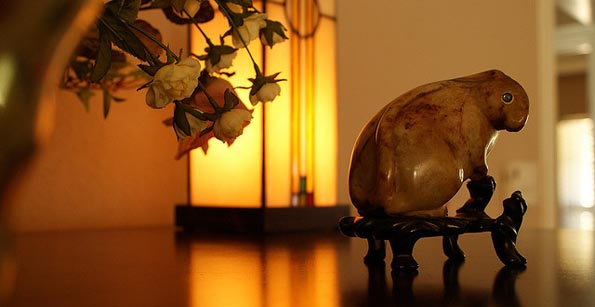
The Chi, a positive energy that brings in prosperity, should always flow freely through different areas in the home. The following are simple feng shui tips for the different areas in the home.
The kitchen
– The stove must be away from the door, but the cook should be able to see the door. If not possible, install a mirror.
– Never position the stove opposite the sink, refrigerator, or dishwasher. A clash of the elements fire and water is not a good idea.
– Keep your cupboard and refrigerator well stocked with food supplies. It implies wealth and abundance.
– Avoid positioning the stove directly in front of a window. Placing the stove to the side of a window is better.
The bathroom or toilet
– Never place the toilet opposite the kitchen. The feng shui fire and water elements will clash in this situation.
– The toilet must not be placed adjacent to the front door. Place the toilet somewhere far away from the front door.
– Avoid positioning the toilet door directly opposite the front door. This may lead to wasted opportunities.
– Place a huge mirror behind the bathroom sink. But never use the kind that is split in the middle, often seen in bathroom cabinets.
– Make sure that the plumbing fixtures in the bathroom and toilet are not leaking, especially the faucets.
The bedroom
– The bedroom should not be adjacent or opposite to a bathroom or toilet. If this is unavoidable, make sure you keep the bathroom or toilet door closed at all times.
– Position the bed as far away from the door as possible. But make sure you still have a good view of the door from the bed. At the same time, do not place your bed where your feet are pointed towards the door when you are sleeping.
– Mirrors should not be placed where they reflect your image as you sleep. Round and oval shaped mirrors are ideal, but make sure they are larger than your head.
– Sleeping directly on the floor is not suggested as it does not allow the Chi to flow beneath you.
The stairway
– Traditionally, the favorable number of steps in a stairway is an odd number. A spiral staircase is also a blunder because it confuses the Chi.
– The worst mistake that can happen is when the staircase leads directly to the front door. This leads to the loss of opportunities, and the residents tend to be always rushing, seldom settling in.
– A good way to slow down the flow of Chi outside the front door is to hang a wind chime on the ceiling above the base of the staircase. A heavy figurine at the floor level below may also act helpful.
Lobbies and hallways
– Hallways need to be free of impediments and are needed to be well lit. It should also be clear to anyone where they are to go next in the house.
– A nice piece of art may be hung on the wall to the end of a hallway. However, never place a mirror there; it will only reflect back the entering Chi.
– There should be no hallway in the house that leads directly to a toilet. If it is already there, just make sure the door is closed at all times.
These are some tips to overcoming and preventing Chi flow problems, giving you a harmonious feng shui home.

